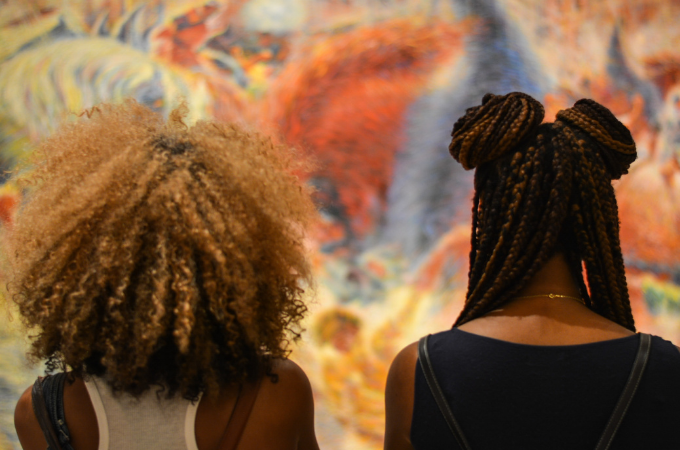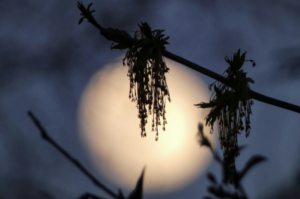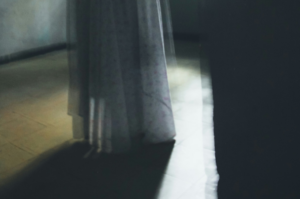
The room pulsed with rotund women whose sweat drooled over their caked foundation and agbada-ed men who spritzed saliva as they bemoaned the lack of ACs. From every corner, people lugged around ghana-must-go’s, which were bursting with frozen food, bulky Ankara cloths and other necessities Nigerians believed they could not find anywhere else and therefore needed to take with them everywhere they went.
In the blistering Lagos air, irksome mosquitos buzzed past Alafia’s ear and the heat beat down on her backside, plastering her shirt to her spine. She was uncomfortable, the familiar kind of discomfort that meant it would be vain to engage in empty, banal complaints like ‘it’s hot’, but just uncomfortable enough that she had to focus on it, this inconvenience, could not channel her energy into anything else like using her phone or reading her book, The Girl with the Louding Voice, which was perched inside her High Sierra bag.
“Where is that my magazine, Mosopé?” said her mother, before collecting a Vanity Fair copy from her daughter. “Abeg let me fan myself before this heat will finish somebody.”
Mummy Mosopé was a woman who liked to comment indiscriminately – on things she knew little about, on things she wasn’t sure of, on things that were better left unsaid. Alafia suspected that her loquaciousness was a distraction from a splintered marriage back home which she had heard rumours about.
They had just reached the entrance – Alafia, Mosopé, and their mothers – and beyond the door, the fractured queue completely broke away, dissolving into an unruly, shapeless swarm of people. A controlled but ubiquitous din hung suspended in the room like a fog.
“If I took a picture of this place for my blog, people would think we’re at My-One market,” Mosopé shook her head, which was crowned with dark, thick 3C hair. Tall, lean and browned to the colour of roasted corn, her understated beauty could be imposing.
Like her mother, Mosopé was aggressively vocal – particularly about Nigeria’s ‘condition’. On her blog (whose name – Sọrọ Sókè – Alafia found trite and falsely encouraging since it was devoid of power if no action followed the speaking out, the sọrọ-sókè-ing) she wrote about everything from the reason why middle-aged security men at the door of iMax thought it was acceptable to holler “Ace! Fine gel!” to the ways in which Nigeria’s overdependence on religion made them inert in demanding change.
And no, if like Mosopé’s hypothetical readers, you thought they were at some kind of public marketplace, think again. They were at Lagos’ international airport.
Alafia saw the world in letters, symbols and signs. It gave a certain icing of rationale and purpose to the more entropic things in life. Everyone and everything could all be reduced to a unit of language, written with a few strokes of her pen.
For example, in her family, she would consider herself the letter ‘K’, which was silent in a number of words but worth a treasure of points in Scrabble. Being withdrawn and slightly cynical, Alafia spent time that could have been used conversing in dinner conversation with family or exchanging memes with friends devouring novels and cooking up the story she herself would write one day. She preferred to blend into the background and judge people silently. On the other end, her younger brother, Tunde, would be an exclamation mark, boisterous and rowdy, a harbinger of elation or alarm.
This was a strange lens to live one’s life through, and she knew this; she often kept it to herself. It would have sounded stupid to others, incomprehensible even – but it helped her cope, escape. And now, in the chaotic slush of Murtala Mohammed Airport, blurring out distractions, she let her mind swim away as she reduced everything and everyone to fit into her compartmentalised world of letters.
She stared at the man at the front of the first line, who was checking passenger locator forms. In a densely Yoruba accent, he barked, “Please, please, please can I ’ave one single file? Let there be horder! ’Ello? Oga at the back, can I ’ave some horder! You – where are you going? British Airways? Yes, okay, go to the back. Epami.”
Pools of perspiration encircled the underarm of his shirt and as he flipped through papers and gesticulated for an orderly queue, a foul odour emanated from it. His nails were overgrown, crusty dirt tucked under them like serifs on a letter. Clearly, Alafia thought, he had bigger problems in life than deodorant management and manicure maintenance.
“How come it is only you handling this whole British Airways line?” Alafia’s mother clucked her tongue. “Haba! This is so inefficient.”
“Madam, I’m sorry,” he retorted with an edgy lilt that professed that he was anything but. “It’s just me here for now. We ’ave to manage.”
Materialising from thin air, an elderly woman who seemed encumbered by her red, heavily bejewelled boubou dress interjected, “Please oga, epami. Where can I find the code for my locator form?” with a familiarly suggestive tone.
And even though he was already holding Alafia’s documents, the attendant wagged a chipped fingernail in Alafia’s face muttering, “One moment, just wait,” before proceeding to attend to this madam, who Alafia thought was getting a lot of attention for someone who was not even in the queue. Still examining his long, decaying nails, she suddenly imagined him as somebody who balled garri in his fist before swirling it in his soup.
Alafia thought he was an A, an ordinary man going through the ancient struggle: wading through the waters of his country through his common airport job, grabbing opportunity with his taloned hands, giving wealthy-looking women special treatment in the hope of a crunchy 100 Naira note reward.
“She will ’elp you with suitcase weight,” the A man directed them to a young woman on his left leaning on the luggage scale, aloof. She was missing three red acrylics nails and wore gawdy slippers that read Gucca. Alafia snorted trying to stifle a cackle. She was not so much amused by the Gucci rip-offs as dumbfounded at how even here, in the almost fatal humidity of Murtala Mohammed Airport, this woman still desired to appear flashy. She is like the letter E, Alafia thought, which wears many decorative accents in other languages, but is still the same underneath… pitiful and predictable.
After weighing their suitcases, the E lady scribbled their measurements on some Sellotape, pressing it flat onto the suitcases with a crimson claw, before directing them to the check-in counter. Not too long after, she would be the one to manually haul the suitcases onto the conveyor belt behind this counter – because “unfortunately our system broke down recently”, even though Alafia sensed it had been broken a lot longer than ‘recently’. Alafia’s mother hissed in disbelief. “It’s just so incredible that how these workers operate… the management is appalling. You know this is why we are sending you girls overseas for education, eh? To come back and fix these problems, you hear?”
The man at the check-in counter wore his glasses at the tip of his nose, so that he had to look down on Alafia as he asked for her passport at which point, he sighed a dramatic sigh, as she fumbled to find it in her backpack, as if to say he was disappointed but not surprised that she had not prepared herself before approaching his station. And even though his oversized cloth mask had slipped below his mouth, lubricated by the beads of sweat trailing down his chin, he added, “and please put on your nose mask”, in a shackled accent that made it sound like “pris purr-on yur nose marsk”, reminding her of Bobrisky.
Embroidered with an aura of false know-how and glassy self-importance, he struck her as an N, which had sharp edges but no orifices, no solid holes to contain substance. This man, she was certain, with his (probably) unmedicated spectacles and forced fòòné accent, was not as educated as her.
Later, when the girls had said bye-bye to their mothers and passed security, they had their passes checked by about three more people before boarding their one-way flight to Heathrow.
***
Sinking into the stiffly plush seat, Alafia let out a breath of relief that she was leaving home – well, leaving Nigeria. ‘Home’ would be a misnomer for this country she felt out of place in.
As she mulled over the sweltering events of the last 5 hours, she was reminded of the layered hypocrisy of Nigeria – from the reeking man who was instructing some to maintain order while letting others cut the line, to the spectacled one who preached a mask philosophy he didn’t practice.
She thought about this inherent conflict, this unrecognised chaos, innate in the airport staff, and whether it represented a larger proportion of the population. Were all Nigerians just conjugations of the same verb?
Before the plane took off, Alafia finished the bowl of minced jollof spaghetti and fried plantain her mother had prepared, her appetite inflamed by impatience. She ate it quickly, unceremoniously, imagining her mother, crushing Knorr cubes between thumb and index finger, licking wooden spoons and orbiting the kitchen, sink to spice drawer to spatula cabinet.
Her mother was like a full stop – she made the family affairs make sense, she got things done, she had the final say. Something about the way she always said, “It’s not too much wahala,” when going out to the supermarket at midnight when the plantain chips at home ran out, or before driving her to the Mainland just to get the braids she wanted, made Alafia feel unworthy, and involuntarily indebted to her.
The spaghetti would give her the energy she needed to work on her English project that was due the next month. As school crossed her mind, she impulsively swivelled her head around looking for Mosopé, probably seated in business-class. She and Mosopé did not talk much in school. Actually, this was an understatement. They did everything they could to stay out of each other’s way. Mosopé brandished her natural hair like a diamond and posted on her Nigerian blog weekly, whereas Alafia didn’t even bother to correct her Caucasian teachers who couldn’t get her name right. They did not share ideals. Alafia believed Mosopé was unnecessarily problematic, too obtrusively African, whereas Mosopé reckoned Alafia a whitewashed traitor. If their mothers did not always arrange for them to be on the same flight, they would not have had to cross paths outside the English classroom.
Opening her laptop to the document titled “Chaos”, she tried to find inspiration for this silly prompt on the blank page before her. They had been told by mousy, freckled Ms. Stanton to ‘really dig deep into their roots’. Should she write about the chaotic scene of the kitchen when her mother cooked? Parallelise it with the chaos that brewed in her mother’s head from being a single parent?
Her mother was perpetually active, cooking or cleaning or sending her only daughter abroad, but Alafia thought that deep down, this ostensible busyness was a blanket for her fear, fear that her daughter’s life would be like that of many other youths in Nigeria. This was why Alafia had never used public transport before. All her life, her mother had cocooned her in precarious parentheses, transporting her everywhere in an air-conditioned jeep and shielding her from the Nigerian reality. Alafia did not feel Nigerian. So somewhere down the line, perhaps in her third year of schooling in the UK, she had decided it would be easier if she altogether pretended she wasn’t.
***
So, as the plane got cooler and she changed into her GAP jumper on the plane, Alafia also put on a new face, a new persona. She cleared her throat and adjusted her accent. She pressed her full, pink lips together so that they looked smaller. She flattened all aspects of her personality, and shrank more into herself, so that when she was reunited with her roommates, Emily and Liza, and they commented, “Omg, you sound so British now!” she took it as a compliment.
Back in the room, the girls unpacked stories from the summer break as well as their suitcases.
“Oh. My. Days,” Emily said. “Robert, yes the Robert in the older year, he’s been chatting me up for bare time.” Emily, doe-eyed and petite, was a ‘Q’, exquisite in her rarity, snug under the attention of others.
“It’s true,” Liza squeaked in her high-pitched voice, the subservient ‘U’ to Emily’s ‘Q’. “I’m not even surprised. He’s so cute. You guys would be perfect.”
“What’s that?” Emily pointed to a clear, plastic package protruding from Alafia’s suitcase as she hung up her jacket.
“Oh, it’s nothing,” Alafia quickly replied, before placing it at the back of her drawer. “Just some ugly dress my mum wants me to wear next week, for Independence Day. I’m not actually going to, though.”
“No, I want to see,” Emily said.
“Yeah, what colour is it?” Liza piped up.
Reluctantly, Alafia brought out the green dress, with its white flowers sitting on the hems, the colour of the flag. Her pale-faced friends stared at it like it was see-through, like they were searching for something more, something missing.
“It’s cute! I love it,” Emily smiled, a little too late and a little too eagerly. Liza nodded. “I think you should wear it, you know, for the culture.”
Alafia shrugged – maybe. But on the 1st of October, she did not wear the dress. She stuffed it into a corner of her wardrobe. She did not want to dress up in this green-and-white dress and waltz around with Africa written all over her. She did not see what Nigeria was celebrating.
When she saw Mosopé and the only other Black girl in her school (Nigerian-American Chiamaka who insisted she was called Chi-Chi), who were both in vibrant blue and green and yellow and white, their native dresses kissing their knees, Alafia received what she believed was an audible death stare from Mosopé.
“It’s such a cold day today anyway,” Emily and Liza told her later that day, and she felt slightly comforted that she saved herself from potential pneumonia. However, this relief fizzled after she read Mosopé’s latest blog: Why Do You Hide the White of Your Flag?
Not even a week later, Mosopé would publish We Are Dying and You Don’t Care in the wake of the EndSARS movement, but it wouldn’t be until three weeks later that everything would fall out of sync.
***
She was at breakfast with Emily and Liza. It was a Wednesday morning, crisp and cool, one of those where you could see your misty breath, one when the warm croissants dried up before you got your tray of food. As Alafia dug her teeth into the hardened bread, a hive of goosebumps rippled through her skin. Emily was prattling on about Robert, who had asked her to come and watch his cricket game later, so that she would fall in love with his muscles. Liza’s nasally voice inserted the necessary commentary of “Shut the front door!” and “Yeah, he’s an absolute mug!”.
Somewhere between fighting the urge to exclaim Jesu! at the tedium of their conversation and imagining the antlered trees outside to be question marks, spineless and swaying in a lack of certainty, Alafia felt a rigid poke on her shoulder. It was Mosopé – but it did not look like Mosopé. Her black afro was not combed today and there was a certain defeat in the disconcertingly knotted balls of hair, something broken in her slight slouch. Her facial features, which always seemed to be in bold, had been thinned to a frail italic – her fixed glare shook, and her pursed lips now trembled.
“Did you hear what they did?” she said, like the two of them were friends who spoke to each other every day. “They killed them! They shot and killed our people, Alafia.”
Impulsively, Alafia felt conscious about the way Mosopé pronounced ‘our’ – she said it like ‘awa’ – and so she glanced quickly at her white friends, to try to catch any fleeting frowns or smirks, to momentarily share in their disapproval of this nakedly African girl.
“What?” she responded, masking her oblivion in blanched innocence. “I didn’t hear anything.”
“Are you serious?” She deflated. “Open your phone and you’ll see. Just check my Snapchat story sef.” She walked away slowly.
Alafia nodded, a premature concern balanced in the arc of her eyebrows. She did not know what Mosopé was talking about, but the fact that Mosopé was talking to her at all was reason enough to be alarmed. She made to leave the dining hall early and use her phone before class.
“I’ll see you guys at break time,” she said to her friends, starting to take her tray away, but the pale-faced pair were already knee-deep in gossip again.
Lekki Toll Gate Tragedy they were calling it. The western media reports were festooned with words like “alleged” and “unconfirmed” as if they didn’t want to be too explicit or as if the story they were telling was incomplete, like an uncrossed ‘t’ or undotted ‘i’.
When Alafia first saw the video, shaky and careless, of the masked men opening fire on the protestors, she felt a lurch of sickening pain. She could not watch all 23 seconds. She called her mother.
“Mummy, mummy? Hello, can you hear me? Are you guys okay? Is everyone okay? I didn’t know before. I just heard now–”
“Alafia, Alafia,” her mother’s usually ebullient voice was pinched with tragedy as well as defeat, like she could not put just how tragic it was into words. “It is so bad. So bad… Sorry I didn’t call yesterday. We didn’t sleep, me and the women in my Watchers group. We were praying all night. It is so bad.”
Alafia spent the whole day of October 21st scouring her Instagram feed, perusing through news articles, and squirming at videos being circulated on WhatsApp, trying to make sense of what was happening, trying to fold her spiralling emotions into a neat box. On Mosopé’s Snapchat story, as promised, was a sight to behold: a picture of a bloodied Nigerian flag, the white blotched by red. The caption read “Our peace has been stained by our people’s blood. Our safety has been jeopardised. So now, our voices will be loud. #SoroSoke! #EndSARS!”
On her primary school friend, Favour’s, Instagram story, a screenshot of Buhari and his friends eating and drinking was posted along with: “ANIMALS IN AGBADA! DEVILS! You are drinking your stupid Aquafina as civilians’ brains lie on the streets”.
Even Nigerian-American Chiamaka retweeted: “TO BRING BACK OUR GIRLS – YOU PEOPLE COULD NOT DO. TO FIGHT BOKO HARAM – YOU PEOPLE COULD NOT DO. TO STOP FULANI HERDSMEN MURDERING PEOPLE – YOU PEOPLE COULD NOT DO. TO FIGHT UNARMED YOUTHS – THAT’S NOW WHERE THEY FIND YOU”.
Alafia had not cried the whole day. The graphic videos that were being exhibited like art, and the electronic insults being hurled at politicians that would never read them, had cracked her, perhaps fractured a vowel or two. But it was not until she accidentally saw her green and white dress for Independence Day, where she had hidden it a few weeks back, that her entire alphabet of peace and order came cascading down.
Squeezing the tough Ankara material in her grip, she cried. She cried because miles away in Nigeria, someone had felt safe in these colours, felt powerful wrapped in their flag, and they had been rewarded by being shot. She cried as she thought about the airport staff and, frighteningly, whether they were alive. She cried for Mosopé, who she had resented for her outspokenness, her unapologetic Nigerian-ness.
She wept until it felt like her heart was beating in her head and her eyes were so swollen, she wished she could close them forever.
Liza and Emily walked in before she could wash her face and pretend nothing was wrong.
“We heard about what happened, babes,” Emily said. “So sorry! Is your family alright?” Suddenly, she was irked by the way Emily’s voice soared at the end of her questions, with the singsong nature of one whose country was not killing her in the streets.
Alafia nodded stiffly. “Yeah, I’m just really tired.”
“Oh, alright, that’s great then. Good. Thank goodness. I was hoping you could help me choose what to wear tonight? Stupid Robert wants to take me to this new sushi place before the game. He’s a mug, but he can be so cute sometimes– ”
“Oh my God! Are you being serious right now?! Do you have any sense of emotional intelligence?! Olodo! Ma gba ori ė! Your head is not correct at all! You are mad! Very mad!”
She heard Liza whisper, “Well, she didn’t have to yell at you…” as she stormed out of the room, but she didn’t care. She had cared for too long about unimportant things – what brand of school bag she used, what people thought of her, whether anyone and everyone she laid eyes on could fit into this reductionist world she had created.
And as she wept some more, crouched outside the bedroom, she knew exactly what her English project would be about.
Over the next couple of days, rumours that the pictures of bloodied flags and rusty corpses were out of context began to sprout. Alafia tried to escape mentally, to temporarily stow her emotions away, but it seemed the letters and signs she had once found safe had been translated into indecipherable hieroglyphics.
“My mummy told me the house was stoned yesterday,” Mosopé told her the next day. She seemed so small now. Since Alafia’s outburst at Emily, and subsequent falling out with the duo, she had naturally drifted towards Mosopé. “Appaz, my father is involved with Tinubu and co. – which is probably why he hasn’t been at home recently – so naturally, my family has become a target… how could he be so selfish?” Mosopé shook her head, as if willing the answer to this to fall out.
Alafia grew charged with the guilt of having blamed Mosopé’s mother for her marital instability. Surmising that no words could carry the empathy and pain she felt without being seasoned with feathery pity, Alafia did something she had never done before and held Mosopé’s hand in hers. And in that moment, when Mosopé did not flinch, did not recoil, Alafia internally resolved to watch Buhari’s address with her the next day. While their relationship had been strained, hyphenated, for a long time, it was as if they wordlessly agreed to put their differences aside in this time of shared grief.
After school the following evening, they watched the presidential address live in the common room. “This cannot be serious!” Mosopé exclaimed when it was over. “Omo! This country is a joke! He didn’t even mention the problem directly! Did not show an ounce of remorse! God forbid!” She drew invisible bridges above her head and snapped her fingers. “God forbid bad thing.”
Alafia felt like a vacuum, the air being increasingly pumped out of her. She had been looking forward to this speech, willing the president to speak the right words and make everything okay. Now, she felt hopeless. And she thought Mosopé was too, until she read her cathartic blog post that night called Wahala For Who No Get President with Sense, referring to Fela’s hit song Beasts of No Nation, “which had recognised Buhari’s blatant incompetence even back when he was a military leader,” she wrote.
Mosopé was the letter ‘O’, which was infinitely symmetrical. She was resilient and didn’t allow life’s troubles to change her shape, to minimise her drive.
Like Mosopé, she needed to pick the fallen letters up, rewrite her story, redefine her fate.
The next day, in Ms. Stanton’s English class, the teacher clasped her hands as she chimed, “Alright, alright everyone, the day we’ve all been waiting for! Creative presentations on the theme of ‘Chaos’!” Her freckles danced as she smiled directly at Alafia. “Ala-fee-yer, why don’t you start us off?”
“Actually, miss, it’s pronounced Alafia. It is the Yoruba word for peace,” Alafia responded, surprising both herself and Mosopé, who raised her eyebrows from the back of the class, impressed.
“This is my presentation responding to the theme of ‘Chaos’:
Nigerians are chaotic
We do not always make sense
We may be starving but will starve some more for our country.
We may be suffering, but will bleed for a brother
It may not make sense to you
You may tell us to quiet down
Tell us we’re being too loud
But we will soro soke.
You can take our peace
You can break our feet
But you cannot steal our voice
We are loud, we are chaos
We will soro soke
I am the man with the H factor
Who uses his negligible stipend to buy my dinner
I cannot afford roll-on
So I roll on, I move on, I soro soke
I am the woman
With chipped nails and cheap shoes
But I climb higher, and I walk faster
I soro soke
I am the man who likes to curdle my accent
To sound like you, the white man
And you laugh at me
But I will only talk louder
I soro soke
We are different
But we are the same
In the streets we are united, joined, we soro soke in chorus
When you kill one of us,
You kill all of us
When you shoot our brother’s leg,
We all bleed
I am chaos, I am messy, I am conflicted
I am Nigeria.”
Photo by Flow Clark on Unsplash










Regina Agaren June 07, 2022 13:07
This was a very engaging and captivating read. Well-done Damilola.